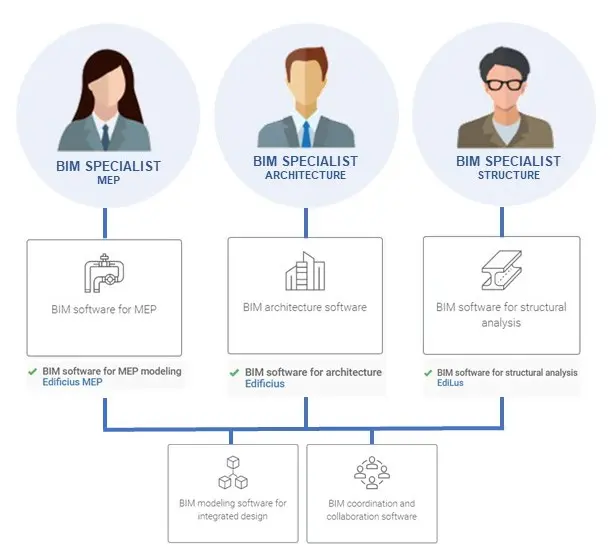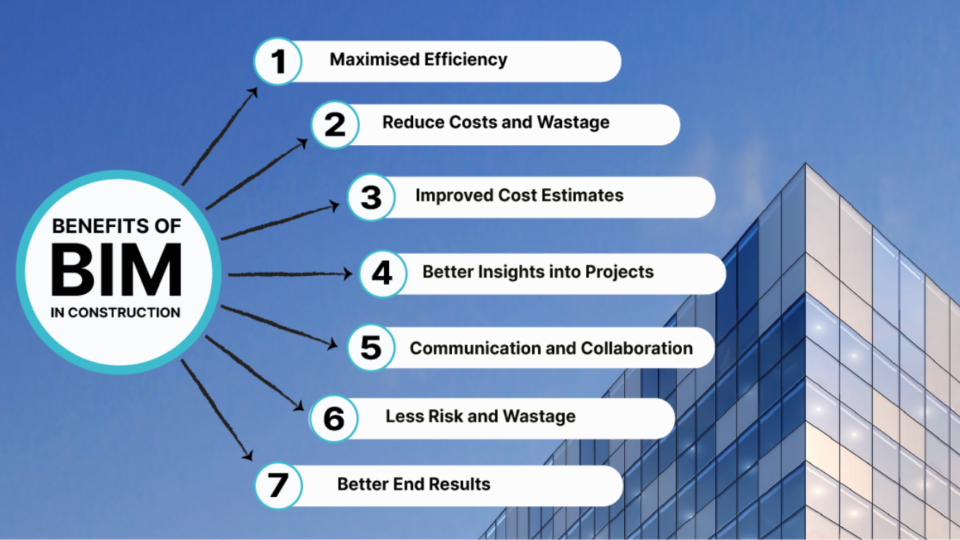BIM Specialist: Roles, Salaries, and Courses to Become One

Table of Contents
Building Information Modelling (BIM) offers a centralised platform for AEC (Architecture, Engineering, and Construction) professionals to work on a multidimensional digital model. It helps in designing, planning, constructing, and managing projects effectively, enabling collaboration and coordination in real-time and ensuring a more organised project execution. Identifying as a BIM professional has become a prerequisite to landing opportunities with the best organisations and future-proofing your career in an industry that is transitioning like never before.
The influence of BIM metamorphosis has created opportunities for diverse roles, such as BIM engineers, BIM coordinators, BIM specialists, BIM consultants, and BIM managers who can optimise processes and manage multiple projects. In this blog, we will specifically explore the roles and responsibilities of a BIM specialist, examine the scope, salaries, and notable benefits associated with BIM expertise, as well as five BIM courses for aspiring BIM professionals.
What is a BIM Specialist?
A BIM specialist is a proficient operator of information management and modelling at an advanced level who uses BIM authoring software. This role involves hands-on experience with architectural, structural, and installation systems modelling, showcasing specialised disciplinary skills necessary for active collaboration. Having a BIM background that aligns with digital workflows provided by the BIM coordinator helps the BIM specialist analyse key components of information specifications and management plans. This ensures compliance with prescribed guidelines accompanied by preliminary checks on the model.
Scope of a BIM Specialist
A BIM specialist is responsible for:
- Creating models through dedicated applications
- Scrutinising information specifications and management plans for compliance
- Converting discipline knowledge into comprehensive models
- Conducting preliminary model tests to ensure accuracy
- Participating in the validation of models to check information consistency
Benefits of BIM
1. Improves Project Workflow
BIM automates multiple tasks that were previously done manually, reducing errors, and repetitive tasks during the pre-construction phase. It introduces a fourth dimension, i.e., time into the process and streamlines project workflow by providing a centralised platform for information. This enables all stakeholders to access and collaborate on a shared model and be up-to-date with the information.
2. Enhances Interdisciplinary Coordination and Collaboration
BIM enables seamless collaboration among designers, engineers, contractors, and consultants. It allows them to work within a unified model where project details are shared and efforts are coordinated in real-time. Leveraging cloud collaboration it allows interdisciplinary coordination from conception to execution. Implementation of design decisions and modifications happens much faster and accelerates the design process. Contractors can also use the shared model to streamline coordination during construction activities. This collaborative approach leads to better-informed decision-making and a more integrated project delivery process.
3. Efficient Documentation
BIM allows creating comprehensive and accurate documentation throughout the project cycle. As changes are made to the model, documentation is automatically updated, reducing the likelihood of discrepancies between drawings and specifications. This efficiency in documentation not only improves accuracy but also saves a tremendous amount of time during the design and construction phases.
4. Reduces Project Costs and Saves Resources
BIM technology not only has provisions for project estimates but also offers the advantage of rapid and accurate assessments of materials, shipping, and labour costs that are automatically updated with revisions. These estimates provide architects and stakeholders with a better understanding of project costs, helping them select cost-effective materials, incorporate pre-fabrication where applicable, and minimise human errors and project delays. It optimises time and resources for a more efficient project management process.
5. Quantifiable Data for Decision-Making
BIM incorporates data-rich models that include information about materials, costs, schedules, and more. This data-driven approach supports better decision-making by providing quantifiable insights into various project aspects, which is valuable for budget planning, resource allocation, and risk management.
6. Budget Planning and Cost Estimation
BIM assists in optimising budget planning by providing accurate and up-to-date information about the project components. Quantity takeoffs, cost estimates, and financial analysis can be generated directly from the BIM model, minimising budget overruns and improving cost control.
7. Clash Detection
BIM enables early detection of clashes and conflicts within the design and construction phases. This proactive approach helps identify and resolve issues before they become costly problems on the construction site. By mitigating risks early in the process, it contributes to a smoother construction workflow and improved project outcomes.
8. Supports Sustainable Construction
With BIM, the design and construction phases are more transparent and efficient, and the operations phase is more controlled. By enabling improved collaboration and data sharing among stakeholders, BIM ensures that decisions are well-informed, resources are optimised, and potential environmental impacts are taken care of. This holistic integration of information and control aligns with sustainable goals and strengthens the long-term resilience of both the construction process and the final built environment.
9.Facility management and Lifecycle Planning
BIM extends its benefits beyond the construction phase by providing facility management and maintenance. The detailed information stored in the BIM model assists the facility managers in efficiently managing and maintaining the built environment throughout its lifecycle, enhancing the long-term sustainability of the project.
Salaries of BIM Specialists
BIM specialists receive attractive salary packages and career growth in India depending on experience, expertise, and sometimes even location. With the escalating demand for BIM professionals, salary trends forecast a positive trajectory for individuals aspiring to build a career in this growing field.
1. BIM Engineer/Designer: A BIM engineer or designer just starting with minimum or no experience can make an average of about INR 25,000 in India. The salary range for an intermediate-level professional with holistic knowledge and decent experience increases to INR 30,000-35,000 per month.
2. BIM Coordinator: A BIM coordinator can command a much higher salary, up to INR 55,000/month or more.
3. BIM Manager: With 5-7 years of work experience, a seasoned BIM engineer can progress to the role of a BIM Manager, making a salary of approximately INR 75,000/month.
4. BIM Consultant: The earning potential of BIM consultants knows no bounds, ensuring continuous growth with every project. BIM engineers often transition into consultancy roles, extending their expertise to companies on a global scale.
Top 5 Online BIM Courses to Upskill in 2024
Aspiring BIM specialists have a variety of options for choosing a course that aligns with their individual goals and circumstances. Numerous online platforms offer diverse BIM courses. The following list highlights courses that not only impart technical skills but equip individuals with industry knowledge essential for a thriving career.
1. BIM Professional Course for Civil Engineers by Novatr
Mode of Study: Online
Duration: Eight months
Certification: Yes
Placement Assistance: Yes
This Autodesk-certified BIM Professional Course for Civil Engineers offered by Novatr is specially designed to address the unique requirements of civil engineering students and professionals who are looking to upskill themselves. Guided by industry experts, it covers 10+ industry-relevant BIM software tools and provides dedicated mentor support to ensure a diverse learning experience. The curriculum delves into topics like information modelling basics, documentation and presentation, 3D visualisation, BIM for infrastructure, 4D and 5D modelling, model-based clash coordination and more.
After completing the course, learners gain insight into BIM processes and industry workflows. They actively engage in a RIBA-structured capstone project, providing hands-on experience in designing and detailing using BIM methodologies. Novatr extends hiring assistance, ensuring participants are well-equipped to land rewarding opportunities in the BIM field.
Read more: Using BIM in Civil Engineering | Everything You Need to Know
2. BIM-Ready+ by TechnoStruct Academy
Mode of Study: Online
Duration: Eight months
Certification: Yes
Placement Assistance: Yes
TechnoStruct Academy presents a comprehensive BIM management program designed to provide a holistic learning experience. This triple certificate program not only awards a post-graduation certificate but also grants a BIM project management certification from Bexel India and a valuable work experience certificate from TechnoStruct LLC, California. The course curriculum includes 12+ BIM software tools along with the methodologies crucial for the entire project life cycle.
The BIM course for civil engineers includes eight modules, covering essential aspects such as BIM management, 3D BIM-model authoring, 3D BIM-model coordination, 4D BIM-time and schedule, 5D BIM-cost and budget, 4D/5D BIM Progress monitoring, cutting edge technology, and culminating in a live project internship. The academy ensures a lifetime of placement assistance.
3. BIM in the AEC Industry Using Revit by Skill-Lync
Mode of Study: Online
Duration: Three months
Certification: Yes
Placement Assistance: Yes
The “BIM in AEC Industry Using Revit” course offered by Skill-Lync provides a comprehensive learning experience tailored for civil engineers passionate about BIM. Led by seasoned industry experts, this online course provides a robust theoretical foundation and practical insights into the domain of the AEC industry.
Students learn the fundamental BIM concepts and explore a range of modelling software such as Revit, Dynamo, and BIM 360. The curriculum is thoughtfully curated to equip learners with the essential skills needed for creating precise BIM models, managing digital standards, and actively engaging in industry-relevant projects. The course is suitable for civil engineering students as well as employees looking to upskill.
4. BIM and Structural Design Analysis by IFS Academy
Mode of Study: Online
Duration: Four months
Certification: Yes
Placement Assistance: Yes
IFS Academy offers a comprehensive and industry-specific PG Diploma training program specialising in BIM and structural design analysis. Tailored for diploma holders and recent graduates in civil engineering, this online BIM course delivers hands-on experience with industry-relevant software like AutoCAD, Civil 2D, Civil 3D, Revit Architecture, Revit Structure, STAAD.Pro, ETABS, and more.
Through live webinars led by experienced industry leaders, students not only gain proficiency in BIM, structural design, and Mechanical, Engineering, and Plumbing (MEP) but also develop essential soft skills. Upon completion, students receive certificates from Autodesk, Bentley Systems, and IFS Academy, showcasing their expertise.
With a 100% placement guarantee, this course helps civil engineers land fulfilling career opportunities. They also offer mechanical, electrical, MEP (Building Services), architectural design, IT, and analysis courses.
5. CAD and BIM by Guvi
Mode of Study: Online
Duration: Five months
Certification: Yes
Placement Assistance: Yes
Guvi, an incubated company of IIT Madras and IIM Ahmedabad, presents a live online CAD and BIM course accredited by Autodesk. It offers dynamic features, including live online classes on weekends, access to lifetime recorded videos, instant doubt-clearing sessions with experienced mentors, and comprehensive placement support. The course covers BIM software such as AutoCAD, Revit, and STAAD.pro across eight modules. It ensures a holistic learning experience with dedicated mentorship from industry experts, 24/7 support, revision sessions, mock interviews, and periodic assessments, creating a well-rounded training experience.
Conclusion
BIM has the potential to keep pace with the evolving needs of AEC professionals and impact how they operate and function. With these developments, numerous benefits and career opportunities are on the rise, increasing the demand for skilled BIM professionals. Enrolling in a comprehensive BIM course can help you navigate the technical advances in the field and open possibilities for excellent work opportunities. With the BIM courses mentioned above, you can equip yourself with the required skills and give your career the edge that it deserves.
Novatr offers a BIM Professional Course for Civil Engineers that will allow you to learn more than 10 BIM software under the guidance of industry experts. You will also be able to implement your skills in a real-world RIBA-structure capstone project and receive placement assistance throughout your career. Start your BIM revolution today.
Head to our Resources page to learn more about BIM, career opportunities and software.

 Thanks for connecting!
Thanks for connecting!
.jpg)
.png)
.png?width=767&height=168&name=BIM-C%20A%20(Course%20Banner).png)
.png)
.png)





